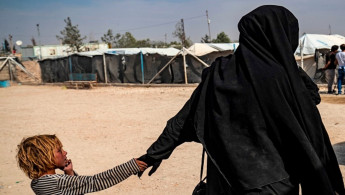Iraqi Kurds one step closer to setting up special court for IS suspects
The parliament of the Kurdish autonomous region in northern Iraq approved legislation drafted with the support of the United Nations, The Guardian reported, opening the path to the setting up of a court in the city of Erbil.
The Kurdish regional government's prime minister, Masrour Barzani, said that “the laws will create the necessary legal framework to prosecute IS terrorists for their crimes against our peoples and humanity at large,” according to The Guardian.
|
|
Initial hearings in Iraqi Kurdistan are expected to focus on those in local custody and then proceed to request transfers of suspects held outside Iraq.
A parallel process is currently being held in the national Iraqi parliament in Baghdad, which is also reviewing legislation that will pave the path to the prosecution of ISIS members for international crimes.
The challenges involved in prosecuting members of the extremist group have been behind Western states’ reluctance to repatriate their citizens who have joined and had links to IS.
Some 40,000 people linked to IS remain in a network of prisons and camps in northeast Syria, in inhumane conditions that have added a human rights emergency to the security threat
Read also: ‘We’re going to stay in Iraq,’ says top US commander
In 2014, the United Nations Security Council failed to refer the conflict to Syria to the International Criminal Court following a double veto by Russia and China.
A number of ideas have been put forward to prosecute IS fighters, including creating an internationally backed tribunal in the region to prosecute the fighters.
Thousands of accused IS members are currently being tried in Iraqi local courts.
The UN, however, found these trials made little distinction between those responsible for violent crimes and those coerced into association with IS for their own survival.
Iraqi forces have also inflicted horrific torture on IS suspects to obtain confessions. Children were tortured, beaten with plastic pipes, and subject to shocks, in order to extract a confession, the agency found.
The UN Security Council established the Investigative Team to Promote Accountability for Crimes Committed by ISIL / Daesh (UNITAD) in 2018.
Its mandate, however, only covers crimes committed in Iraq and will not investigate those committed in Syria.
In December 2016, the UN established the International, Impartial and Independent Mechanism (IIIM) to assist in prosecuting those responsible for "the most serious crimes committed under international law" committed in Syria.
However, unlike UNITAD in Iraq, the IIIM does not have the support of Syria's ruling Assad regime.





 Follow the Middle East's top stories in English at The New Arab on Google News
Follow the Middle East's top stories in English at The New Arab on Google News
![Both Hamas and the Palestinian Authority welcomed the ICC arrest warrants [Getty]](/sites/default/files/styles/image_330x185/public/2024-11/GettyImages-2178351173.jpg?h=199d8c1f&itok=TV858iVg)

